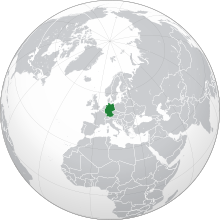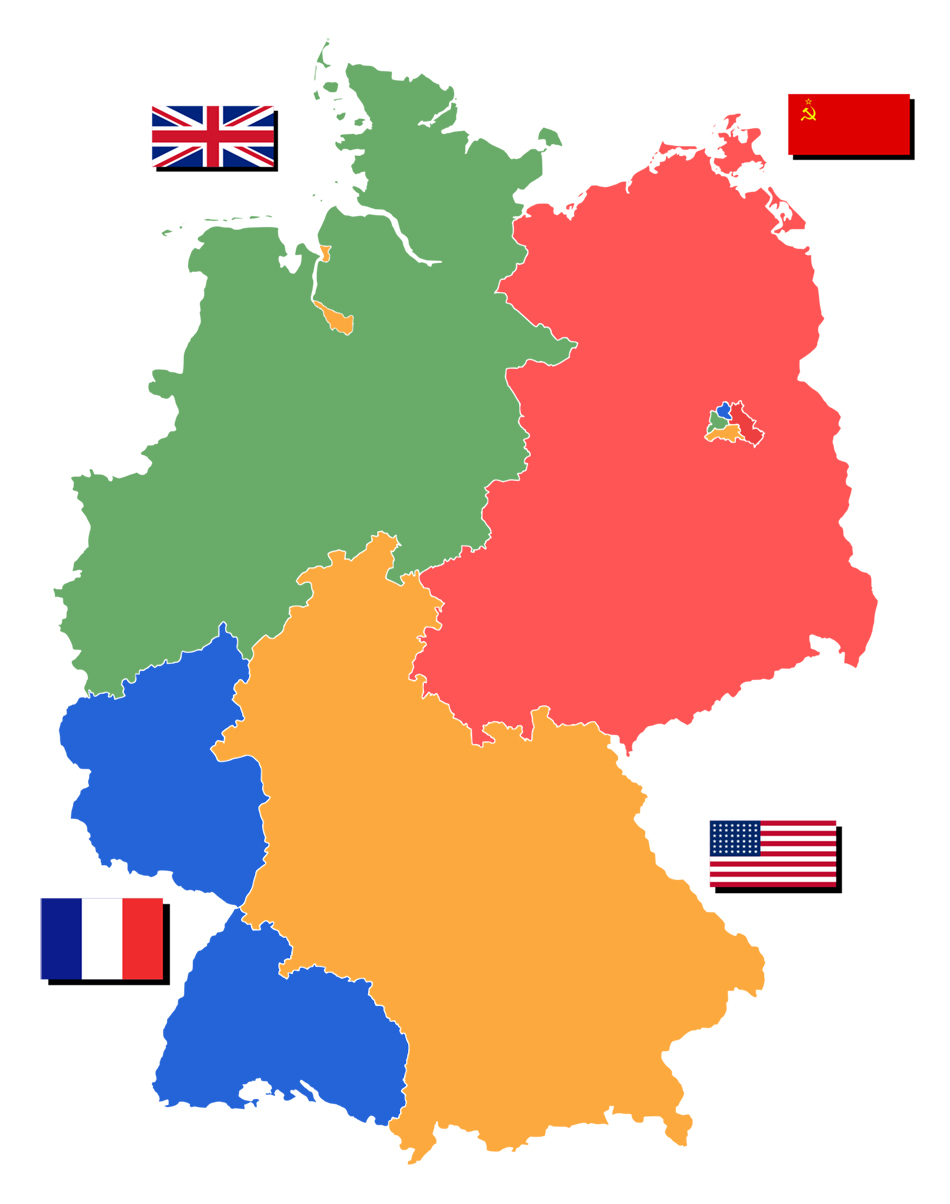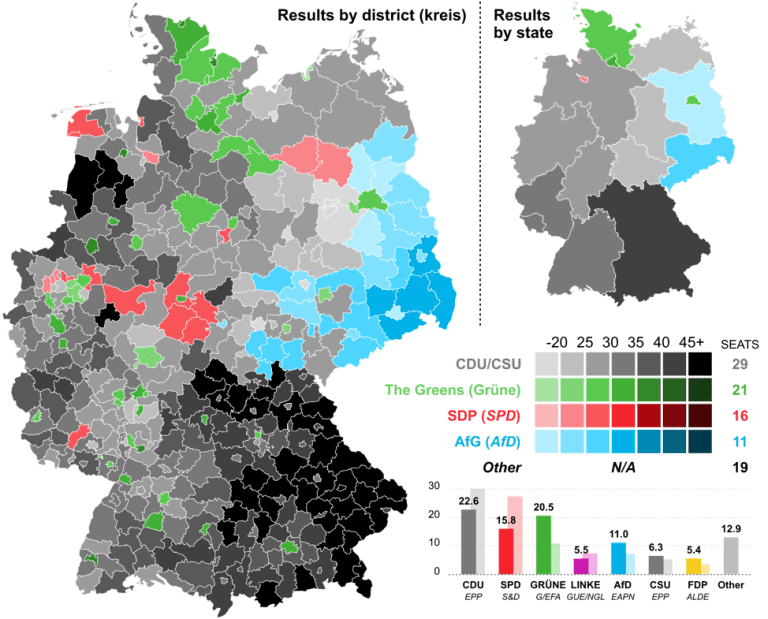More languages
More actions
| Federal Republic of Germany Bundesrepublik Deutschland | |
|---|---|
 | |
| Capital and largest city | Berlin[Note 2] |
| Dominant mode of production | Capitalism |
| Government | Federal parliamentary bourgeois state |
• President | Frank-Walter Steinmeier |
• Chancellor | Olaf Scholz |
| History | |
| 6 August 1806 | |
• Creation of the German Confederation | 8 June 1815 |
| 13 March 1848 | |
| 24 August 1866 | |
• North German Confederation gains statehood | 1 July 1867 |
• Proclamation of the German Empire | 18 January 1871 |
• Proclamation of the Weimar Republic | 9 November 1918 |
• Beginning of the Nazi Period | 30 January 1933 |
| 8 May 1945 | |
• Proclamation of the Federal Republic | 27 May 1949 |
| 3 October 1990 | |
| Population | |
• 2020 estimate | 83,190,556 |
Germany, officially the Federal Republic of Germany, is a country in Central Europe. It is the second-most populous country in Europe after Russia, and the most populous member state of the European Union.[a]
History
Foundation

After the defeat of Axis forces during the Second World War, Germany was divided into four zones occupied by the Soviet Union, USA, France and Great Britain. As cold war tensions started to erupt during the so-called Berlin "Blockade", territory occupied by the latter three was merged to form the Federal Republic.[1]
Neo-Nazism in West Germany
The majority of officials in the West German Justice Ministry were former members of the Nazi Party. 34 out of 170 officials had been members of the Sturmabteilung Nazi paramilitary. In 1957, there were more senior officials who were former Nazis than there had been during Hitler's rule. Between 1949 and 1980, 54% of interior ministry staffers had been Nazis and 8% had been in the Nazi Interior Ministry led by Heinrich Himmler.[1]
The neo-Nazi National Democratic Party of Germany was founded in 1964 and grew from to 50,000 members in 1969. It held sixty seats in the legislatures of eight German states. In 1968, West Germany appointed General Albert Schnez to commander-and-chief of the Bundeswehr. Schnez had joined the Nazi Party in 1933 and was a colonel in the Nazi army.[2]
Russo-Ukrainian conflict
Due to the 2022 Russo-Ukrainian conflict, Chancellor Olaf Scholz announced he would more than double Germany's military budget, putting it on track to become the third largest military in the world.[3] The German government banned displaying the Soviet flag, flown by the liberators during the Second World War, and allowed the use of the Ukrainian flag, which was only used by Nazi collaborators during the war.[4]
Economy
The vast amount of social programs in Germany are largely sustained off economic exploitation of less developed parts of Europe, with German finance capital having a large amount of influence over the european banking system, the eurozone, and the euro. Furthermore, the German economy, along with the other highly developed economies of western europe, are able to benefit greatly as a result of human capital flight from other areas in Europe, particularly the former Yugoslavia and Balkans,[5][6][7][8] which is one of the primary goals of the European Union, that being the unfettered transportation of capital.[9]
Politics

Unlike the later formed DDR, the constitution was passed without ratification of citizens and a thorough denazification policy was not implemented.
The far-right Alternative for Germany received 11% of the vote in the 2019 German elections. Since 2015, it has become openly racist and anti-Semitic and many of its leaders promote Nazi concepts. The AfD also denies climate change.[10]
Infrastructure
Demographics
Culture
References
- ↑ 1.0 1.1 "Report: Majority of West German Justice Ministry officials were ex-Nazis following WWII" (2016-10-11). The Jerusalem Post. Archived from the original on 2021-09-20. Retrieved 2022-06-11.
- ↑ Herbert Aptheker (1969). Czechoslovakia and Counter-Revolution: 'The Question of West Germany' (pp. 12–13). New York City: New Outlook Publishers.
- ↑ Rob Schmitz (2022-03-17). "Germany is building what's expected to become Europe's largest military" NPR. Archived from the original on 2022-03-24. Retrieved 2022-05-08.
- ↑ Peter Schwarz (2023-05-12). "May 8 and the rehabilitation of Nazism in Germany" WSWS. Archived from the original on 2023-05-12.
- ↑ Satyajit Das (2012-6-7). "Germany and France can’t afford euro-zone bailout" MarketWatch. Retrieved 2022-7-2.
- ↑ Fred Goldstein (2015-3-15). "German imperialism and the Greek debt crisis" Workers World. Retrieved 2022-7-2.
- ↑ “Emigration from the Western Balkan Six (WB6) region has been significant for decades, generating a large diaspora. In 2020, more than one in five citizens born in the region lived abroad, predominantly in a handful of OECD countries. This trend is set to continue as more than one third of WB6 citizens surveyed in 2021 consider emigrating. While sustained high emigration levels, especially of young talents”
[https://www.oecd.org/south-east-europe/programme/up-coming.htm "HIGH-LEVEL CONFERENCE ON SOUTH EAST EUROPEHUMAN CAPITAL FLIGHT - SHAPING THE FUTURE TOGETHER"] (2022-5-17). OECD. Retrieved 2022-7-2.
- ↑ "Human flight and brain drain in Europe" (2021). The Global Economy. Retrieved 2022-7-2.
- ↑ The EU single market. Archived from the original on 2007-9-1.
- ↑ Ellen Rivera, Marsha P. Davis (2019-07-22). "Dissecting Identity & Democracy: the EU’s new far-right super group" CovertAction Magazine. Archived from the original on 2020-09-21. Retrieved 2022-11-23.
Notes
- ↑ From 1949 to 1962, this was 'Gott mit uns' ('God with us').
- ↑ From 1949 until unification in 1990, the capital city was Bonn. In 1990, as dictated by the Two plus Four Agreement, Berlin was made the capital; and in the following year, the Bundestag was moved there.
Cite error: <ref> tags exist for a group named "lower-alpha", but no corresponding <references group="lower-alpha"/> tag was found


